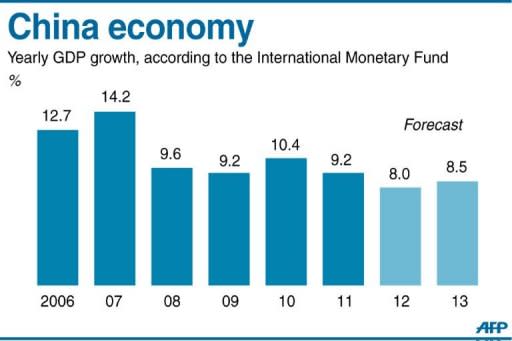China's economy to rebound in second half: IMF
China's economy will rebound in the second half of 2012 to expand eight percent annually as government policies to spur growth take effect, the International Monetary Fund said Wednesday. "Growth is expected to bottom out in the second quarter, and then accelerate in the second half of the year," the IMF said in an annual report on China's economy, which it also predicted would grow 8.5 percent in 2013. The Fund noted that Chinese authorities, whose views are included in the report, said they had been pursuing policies to achieve a more sustainable pace of growth. "This managed slowdown, however, has run into stronger-than-anticipated headwinds from the worsening of the euro area crisis," the IMF said. "Measures to support growth are now being given more prominence and the authorities are confident that growth will be at least 7.5 percent this year." Still, an expansion of eight percent would mark a further deceleration for China, a key engine of global growth. The economy, the world's second biggest, grew 9.2 percent in 2011 and 10.4 percent in 2010. Authorities, worried the economy was overheating, from 2010 tried to rein in growth by raising borrowing costs and suppressing bank lending, among other steps. But the slowdown has prompted them to start unwinding some of those measures, including cutting interest rates and loosening requirements for the amount of reserves banks must maintain, in order to spur lending and boost activity. The IMF also said that the government has room to do more. "The authorities have taken the foot off the brakes, but they have not yet stepped on the accelerator," Markus Rodlauer, the head of the IMF's China team, said in a conference call to discuss the report. "But they are ready to do so and they have room to do so if needed," he said. Chinese leaders have repeatedly expressed concern over the weakening economy and vowed to take further measures. Premier Wen Jiabao has called stabilising growth the government's top priority. Growth slowed to a more than three-year low of 7.6 percent in the second quarter, marking the sixth straight three-month period in which it had slowed. The Washington-based IMF said the projection of eight percent growth was based on the premise that China maintains policies aimed at such a result. The IMF's assessment echos many private economists, who also see the economy rebounding in the second half. The Fund cited the ongoing eurozone sovereign debt crisis as the biggest external risk facing China's economy. "The authorities were concerned about the external outlook, especially the risk of a worsening of the euro area crisis and the lack, so far, of a sufficiently strong policy response within Europe," it said. Regarding China's currency, the IMF changed its assessment from last year's report, determining that the renminbi, or yuan, is now more closely aligned with the country's economic fundamentals. "The degree of undervaluation of the renminbi has come down significantly," Rodlauer said, adding that the Fund now sees the currency as "moderately undervalued against a broad basket of currencies." He cited a sharp decrease in China's current account balance, a slowing pace of foreign reserve accumulation and the yuan's strengthening in recent years as factors, though he added "some further appreciation is appropriate". Chinese authorities, however, see the currency market as "already basically in equilibrium", the IMF report said.




